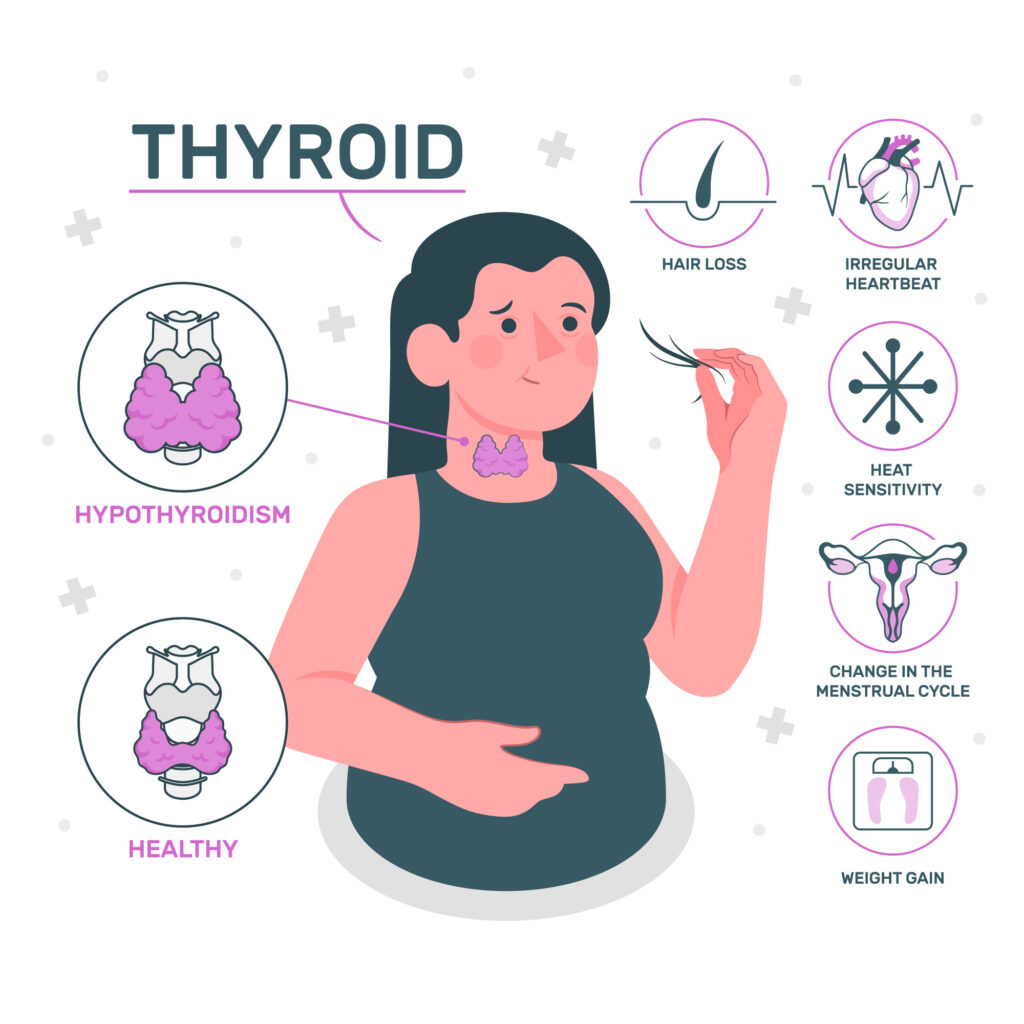
Hypothyroidism is a common thyroid disorder that affects millions of people worldwide. This condition occurs when the thyroid gland fails to produce enough thyroid hormones, leading to a range of physical and psychological symptoms. In this article, we will explore the causes, symptoms, complications, and treatment options for hypothyroidism.
Causes of Hypothyroidism:
Hypothyroidism is a thyroid disorder characterized by an underactive thyroid gland, which fails to produce sufficient thyroid hormones, primarily thyroxine (T4) and triiodothyronine (T3). These hormones play a crucial role in regulating various bodily functions, including metabolism, energy production, and temperature control. When the thyroid gland doesn’t function properly, it can result from a variety of underlying causes:
1. Autoimmune Thyroiditis (Hashimoto’s Disease):
This is the most common cause of hypothyroidism. It occurs when the body’s immune system mistakenly identifies the thyroid gland as a threat and attacks it. This autoimmune response leads to chronic inflammation and gradual destruction of thyroid tissue. Over time, the thyroid gland becomes less capable of producing thyroid hormones.
2. Surgical Removal of the Thyroid Gland:
Some individuals may need surgery to remove part or all of their thyroid gland due to conditions like thyroid cancer, goiter, or nodules. In such cases, the remaining thyroid tissue may not produce sufficient hormones, leading to hypothyroidism.
3. Radioactive Iodine Treatment:
Radioactive iodine therapy is often used to treat hyperthyroidism (an overactive thyroid). However, this treatment can sometimes result in an underactive thyroid if it inadvertently damages or destroys too much thyroid tissue.
4. Medications Causing Hypothyroidism:
Certain medications can interfere with thyroid function and lead to hypothyroidism. These include lithium (used to treat bipolar disorder), amiodarone (used for heart arrhythmias), and some anti-thyroid drugs.
5. Congenital Hypothyroidism:
Some individuals are born with an underactive thyroid gland due to genetic factors or developmental issues during pregnancy. Early detection and treatment are essential to prevent developmental delays and intellectual disabilities in affected infants.
6. Pituitary or Hypothalamic Disorders 2° Hypothyroidism:
Hypothyroidism can also result from problems in the pituitary gland or hypothalamus. These glands produce hormones that regulate the thyroid. If they malfunction, they can fail to signal the thyroid to produce enough hormones, leading to a condition known as secondary or central hypothyroidism.
7. Iodine Deficiency:
Iodine is a vital component of thyroid hormones. A lack of iodine in the diet can lead to an enlarged thyroid gland (goiter) and eventually hypothyroidism. However, iodine deficiency is rare in regions where iodized salt is commonly used.
8. Viral Thyroiditis:
Viral infections, such as subacute thyroiditis, can cause temporary inflammation of the thyroid gland, disrupting its function. This can result in a transient form of hypothyroidism, but thyroid function usually returns to normal once the infection resolves.
9. Certain Chronic Diseases:
Some chronic conditions, such as celiac disease and rheumatoid arthritis, are associated with an increased risk of autoimmune thyroiditis and subsequent hypothyroidism.
10. Aging:
While not a cause in itself, aging can lead to an increased risk of developing hypothyroidism. The thyroid gland may naturally decline in function as people get older.
Symptoms of Hypothyroidism:
The symptoms of hypothyroidism can vary in severity and may include:
- Fatigue and Weakness: Individuals often feel extremely tired, even after a full night’s sleep.
- Weight Gain: Hypothyroidism can slow down metabolism, leading to unexplained weight gain.
- Cold Sensitivity: People with hypothyroidism may feel cold more easily than others.
- Dry Skin and Hair: Skin may become dry and hair brittle, and it can lead to hair loss.
- Constipation: Slowed digestive processes can result in chronic constipation.
- Muscle and Joint Pain: Muscle weakness and joint pain are common complaints.
- Depression and Mood Swings: Hypothyroidism can affect mood, causing symptoms like depression and irritability.
- Memory Problems: Cognitive function may decline, leading to memory issues and difficulty concentrating.
- Irregular Menstrual Periods (in women): Women with hypothyroidism may experience irregular or heavier menstrual periods.
- Hoarseness: A hoarse voice can occur due to swelling in the throat.
- Elevated Cholesterol Levels: High cholesterol is a potential consequence of hypothyroidism and can contribute to heart disease.
Complications of Hypothyroidism:
Untreated hypothyroidism can result in various complications:
- Cardiovascular Issues: High cholesterol levels can lead to atherosclerosis (hardening of the arteries) and an increased risk of heart disease.
- Myxedema: This is a rare but life-threatening condition that occurs in severe, untreated hypothyroidism. Symptoms include extreme fatigue, low body temperature, and unconsciousness.
- Mental Health Issues: Untreated hypothyroidism can worsen symptoms of depression and lead to cognitive impairments.
- Goiter: The thyroid gland may enlarge in an attempt to produce more hormones, resulting in a visible swelling in the neck.
- Infertility: Women may experience fertility issues due to irregular menstrual cycles and disrupted ovulation.
- Birth Defects: If a pregnant woman has untreated hypothyroidism, it can affect the developing fetus, potentially leading to cognitive and developmental issues.
- Peripheral Neuropathy: Numbness and tingling in the extremities can occur due to nerve damage.
Other System Involvements:
Hypothyroidism can impact various body systems:
- Digestive System: Slowed metabolism can lead to constipation and weight gain.
- Musculoskeletal System: Muscle weakness and joint pain can affect daily activities.
- Cardiovascular System: High cholesterol levels can increase the risk of heart disease and stroke.
- Reproductive System: Irregular menstrual cycles and fertility issues may affect women’s ability to conceive.
- Nervous System: Cognitive impairments, depression, and fatigue can have a significant impact on mental health and daily functioning.
Treatment :
Managing hypothyroidism typically involves the following:
- Thyroid Hormone Replacement: The cornerstone of treatment involves taking synthetic thyroid hormone medication (e.g., levothyroxine) daily. The dosage is carefully adjusted based on regular blood tests to maintain optimal hormone levels.
- Lifestyle Modifications: Adopting a healthy lifestyle, including a balanced diet and regular exercise, can help manage weight and alleviate some symptoms.
- Regular Monitoring: Patients should have regular check-ups to ensure their thyroid hormone levels remain within the normal range.
In conclusion, hypothyroidism is a complex condition with a wide range of causes, symptoms, and potential complications. Early diagnosis and appropriate treatment are vital to effectively manage this condition and maintain a high quality of life. If you suspect you have hypothyroidism or experience any related symptoms, it’s essential to consult a healthcare professional for proper evaluation and guidance.


Pingback: Home - Common health conditions - ECG Oxford